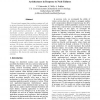Free Online Productivity Tools
i2Speak
i2Symbol
i2OCR
iTex2Img
iWeb2Print
iWeb2Shot
i2Type
iPdf2Split
iPdf2Merge
i2Bopomofo
i2Arabic
i2Style
i2Image
i2PDF
iLatex2Rtf
Sci2ools
103
click to vote
SERP
2003
2003
Performance of Service-Discovery Architectures in Response to Node Failures
Current trends suggest future software systems will rely on service-discovery protocols to combine and recombine distributed services dynamically in reaction to changing conditions. We investigate the ability of selected designs for service-discovery protocols to support real-time distributed control applications by detecting and recovering from failure of remote services. We model two architectures (two-party and three-party) underlying most commercial service-discovery systems. We use simulation to quantify functional effectiveness achieved by the two architectures as the rate of failure increases for remote services. We further decompose non-functional periods into failure-detection delay and recovery delay. Our quantitative measurements suggest that a two-party architecture yields better robustness than a three-party architecture. We discuss the underlying causes for this outcome.
Remote Services | SERP 2003 | SERP 2007 | Service-discovery Protocols | Two-party Architecture Yields |
Related Content
| Added | 01 Nov 2010 |
| Updated | 01 Nov 2010 |
| Type | Conference |
| Year | 2003 |
| Where | SERP |
| Authors | Christopher Dabrowski, Kevin L. Mills, Andrew L. Rukhin |
Comments (0)

